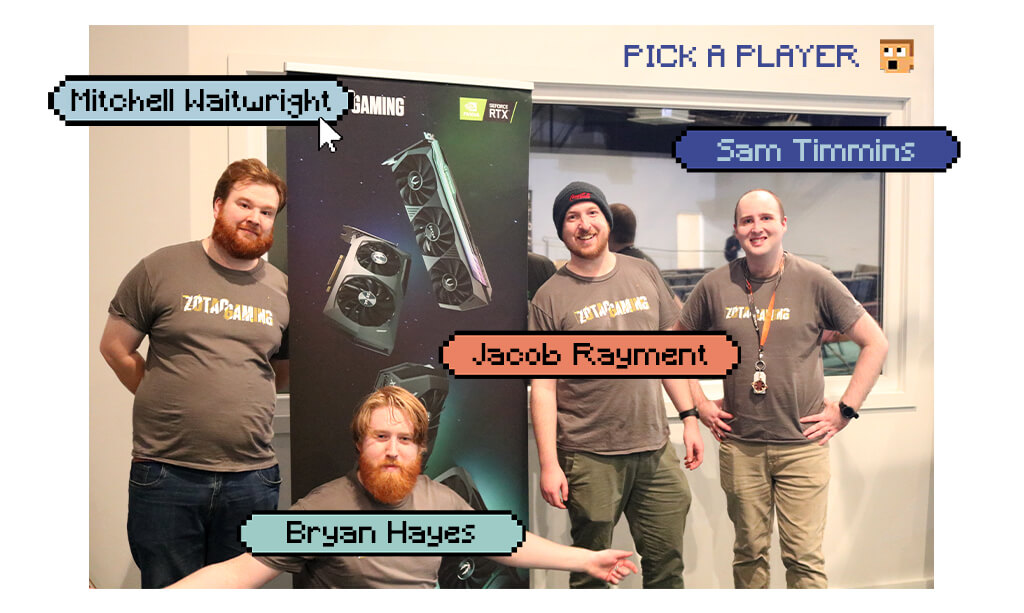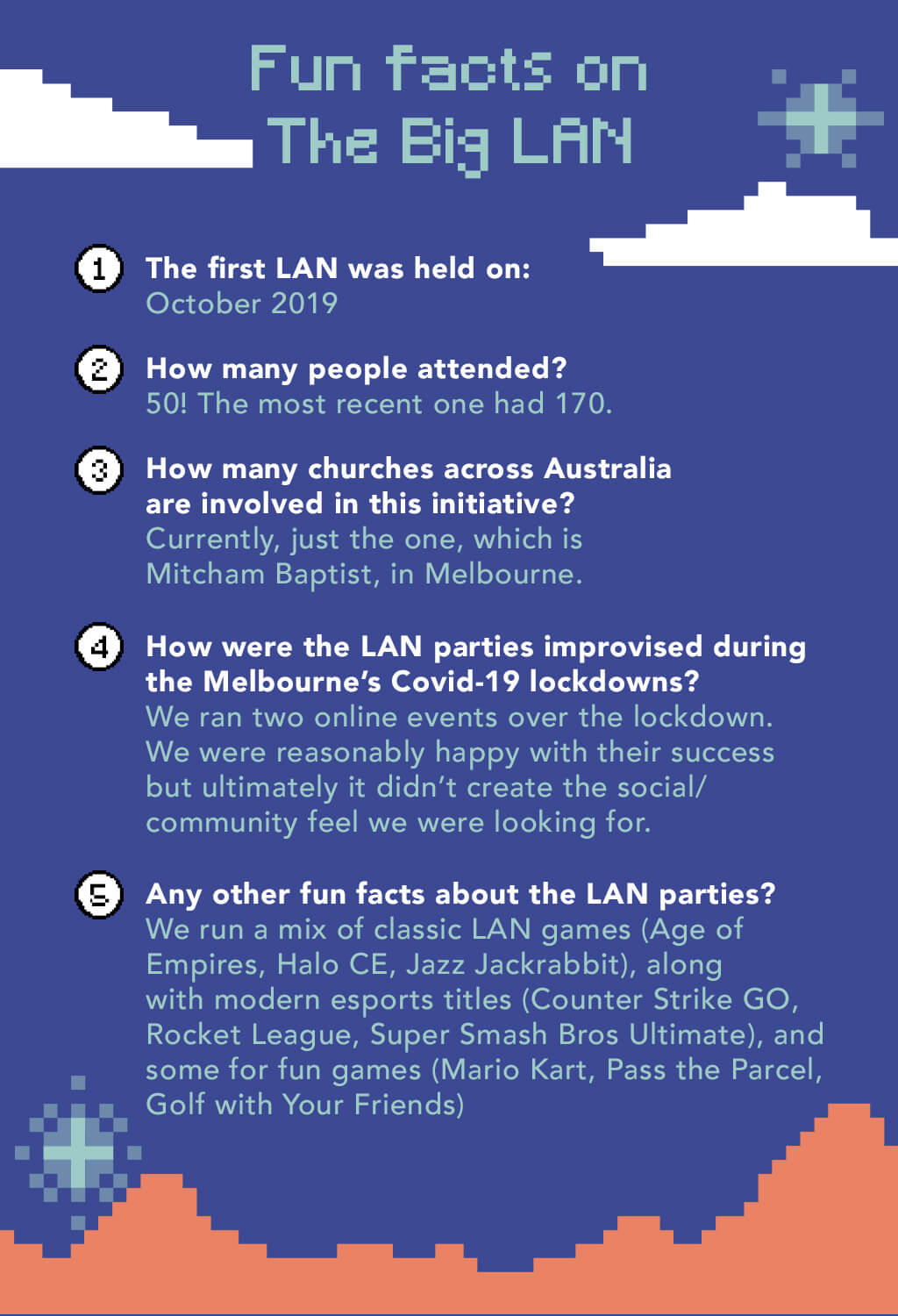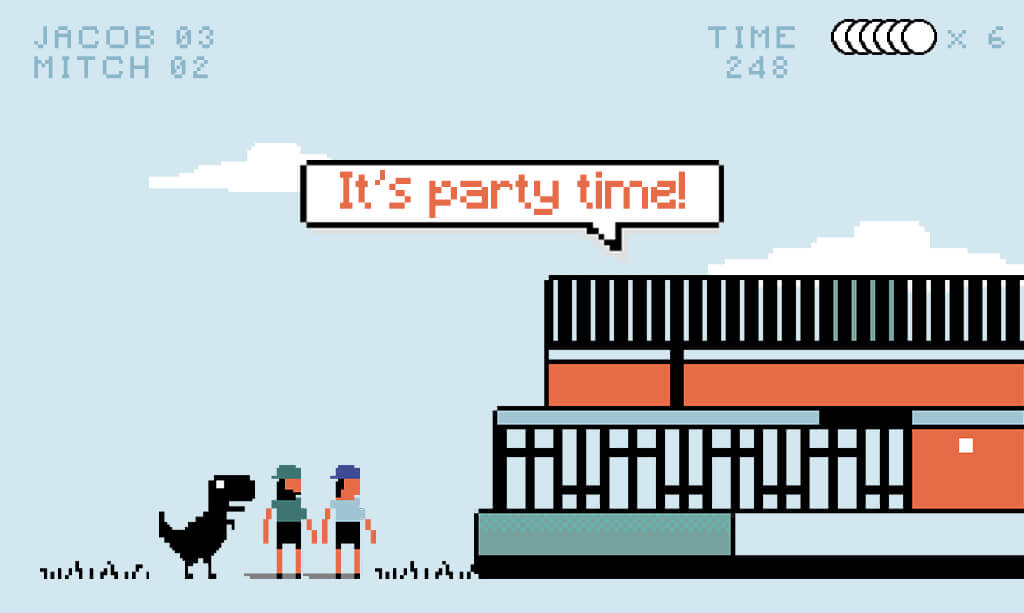How Two Friends Got a Church to Host a Gaming Party
![]()
Once every three months, Mitcham Baptist Church, in Melbourne, Australia, hosts a service of a different kind—a LAN party.
A LAN (local area network) party is a social gathering for gamers coming together for hours of gaming and socialising.
Chairs for their Sunday worshippers are pushed away to make way for big spacious tables, rigged up Internet cables, and a trestle table loaded with prizes. Soon, its carpark will be filled with gaming enthusiasts, pulling in with their supped-up computers, ready to while several hours of the afternoon in the company of friends, both old and new. A barbecue sits at the ready by the church’s entrance, waiting to be fired up to feed their guests a lunch of sausage sizzle as gaming fuel.
The inaugural The Big LAN party was held in Mitcham Baptist in 2019, and it is something the church looks to continue hosting into the future, especially now that Covid-restrictions are easing in Australia.
The party is the brainchild of Jacob Rayment and his mate, Mitchell Waitwright, who had fond memories of getting together with their mates over video games. The two met at a LAN party and a firm friendship grew out of it.
Read on as Jacob chats to YMI more about the party, and why he’s pouring waves of energy into it.

Simply buzzing: The crew who brought the LAN party to life
1. First of all, tell us a little about yourself.
My name is Jacob and I’ve been a big fan of gaming since I was little. My family had a copy of a Christian game called Super 3D Noah’s Ark, a first-person shooter game where you slingshot food at animals that had escaped their cages on the ark.

I’ve always loved puzzles, critical thinking, reflex-based challenges, and exploring new worlds, so video games were a perfect fit for me. It also allowed me to form friendships and connect with others who shared the same hobby.
2. How did the idea of hosting a LAN party come about?
When I was in high school, I struggled to engage with my local youth group as we didn’t have a lot of similar interests. While I enjoyed the high-energy nature of the group, I also had a lot of social anxiety and found it difficult to connect and make friends.
When my church started running a LAN party, that was a much more natural social environment for me. Playing a video game together gives you a common reference and talking point with the other person, and this made it easier for me to chat with people and make friends. In fact, I met my best mate Mitch at a church LAN party.
Years later, Mitch and I were reminiscing about the old LAN parties from our youth, and we started to wonder whether we’d be able to run one ourselves. As it turns out, we could.
3. I understand that part of the idea of hosting the LAN party in a church is to get people to see church differently. Why do you think there’s such a resistance in the Western world when it comes to church?
Over the past decade or so, the global church has experienced a lot of damage to its reputation, and the notion that the church is full of bigots and hypocrites has become quite common, especially among the younger generation.
As much as it pains me to say it, a lot of this reputation is deserving. While there are plenty of Christians that don’t fit any of these descriptions, there are a number that do, and they are often the most vocal ones.
4. How does the LAN party hope to address this resistance? How do you go from your LAN activity to even broaching the subject of faith?
The Big LAN doesn’t, and never will, broach the subject of faith at our events. It just isn’t what they are for. It’s about making the church a community space.
I’m much more interested in showing people that a local church is happy to just run an event that they can enjoy. It’s about demonstrating that, as much as the church is about being a place of worship, it’s also a building and a community that is dedicated to serving the larger community with no agenda or ulterior motive, other than for people to have a good time and make new friends.
When I was at Uni, one of the most off-putting things to me about one of the Christian on-campus organisations was their very ‘in-your-face’ approach to inviting people to things. Many times, people would walk up to me and before learning anything about me, they would try to invite me to a thing. If I, a Christian, felt turned off by this, imagine how someone who wasn’t already friendly with the concept of Christianity would respond.
I think the key thing is that we need to be friends first. Let our actions speak for us, not our words. If we are a great friend and they want to learn more about what we believe, that’s great, and if they don’t, that’s okay too, we shouldn’t stop trying to be a good friend.

5. What were the challenges in getting the first LAN party up and running?
We had our first LAN party in October 2019. The first big challenge we had was getting the church on board. There weren’t many other people at the church that really understood the event, or how it could be run, or what sort of budget it would require.
After about a year of nagging my youth pastor about it, I decided to just push forward with it myself and run the event on no budget. I found a date that the church was available, called in favours to borrow networking equipment from another LAN group (LAN-Slide), and rallied some companies to sponsor prizes. We charged the gamers $20 per ticket, but that includes lunch and dinner.
The party was a great success, and from that point on, the church was on board as they were starting to understand the value of the event and the benefit it provided to the community.
![]()
6. What are the value and benefits that you’ve seen these LAN parties provide to the community?
We provide a social aspect to a hobby that many consider antisocial or asocial. If you like sport or music, there are heaps of social events for you, but if you like gaming, it’s often done alone in your own space. This LAN party gets people with the shared interest in gaming into the same room and socialising.
7. Why was it so important to you that these LAN parties bring in the socialising aspect?
I think as a society we are socialising less. Everything is available to us now at the click of a button. Food can be delivered, entertainment is cheaply available in your own home (games, Netflix, etc.). Even things like exercise equipment, home cinemas, gourmet food kits, and other things that you used to have to go out for, are more affordable and easily available to you in your own home.
I think a lot of people are lonely and don’t necessarily know what to do about it, but it can lead to things like depression. Humans are social creatures, and most people, even introverts, need social interaction. We need to provide these opportunities that aren’t available anywhere else.
8. Do you guys connect with some of the people you meet at the LAN parties outside of these parties?
Absolutely! I’m always looking for new friends to play games with and this provides a great opportunity to connect with other gamers. When we meet outside of the LAN parties, we usually play video games and board games, or just catch a movie or go to the pub.

9. What have you observed from this experience, especially with regard to how people tend to see the church?
I think it’s been a real eye opener for a lot of church people and others that there is a massive opportunity for churches to serve the community. There’s something quite special about walking in and seeing a hundred people on their computers playing games and chatting away.
What I’ve really learnt is that people can respond positively to a church running community events. When people see that there is no hidden agenda, they can see that the church really does care about just helping the local community.
10. What other plans have you got for future LAN parties? What’s your next LAN party going to look like?
The main goal now is to continue to grow. We’d like to reach 150 attendees in the near future, and potentially run some other LAN parties in other churches around the state of Victoria, Australia. The next LAN will be fairly similar to the last few. Right now we are still focusing on refining our processes and building up a following, so we won’t do anything too crazy to mix it up just yet.
Running a LAN party requires a broad set of skills. You need someone that knows how to manage, setup, and troubleshoot a large-scale network. You also need someone that can advertise and has good connections to find sponsors. On top of that, you need a venue with sufficient power and internet.
If you want more information on running a LAN or being part of The Big LAN, you can contact me at jacob@thebiglan.com











Leave a Reply
Want to join the discussion?Feel free to contribute!